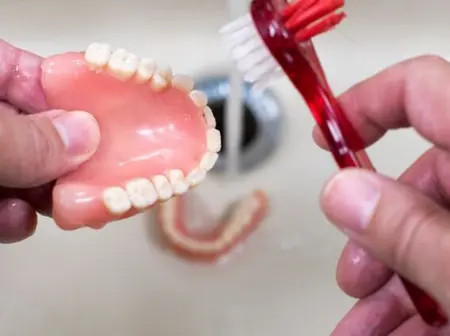Dentures are a great solution for individuals who need to replace missing teeth, restoring both function and confidence. However, they come with their own set of challenges, one of which is bad breath. If you’ve noticed an unpleasant odour, you’re not alone. This is a common issue that can stem from trapped food particles, bacteria, or improper care. Here are four effective strategies to avoid bad breath with dentures.
Cleaning your dentures thoroughly and consistently is the foundation for fresh breath. Dentures can harbour food particles and bacteria, which lead to odour if not properly cleaned. Remove your dentures daily and give them a gentle scrub with a soft-bristled brush and a specialized denture cleaner.
Be sure to soak them overnight in a solution designed for dentures to give them a deep clean. Avoid using regular toothpaste, as it may be too abrasive and could damage the material of the denture. By committing to a cleaning routine, you ensure your dentures remain odour-free and last longer.
Even with dentures, your mouth still requires care. You need to keep your gums, tongue, and any remaining natural teeth clean to prevent plaque buildup and bad breath. Gently brush your gums and tongue daily to remove bacteria and keep your mouth feeling fresh. Rinsing with warm salt water can also help eliminate debris and soothe oral tissues.
If you use a denture adhesive, make sure to clean off any residue thoroughly before reinserting your dentures, as leftover adhesive can contribute to odour. Incorporating proper oral hygiene into your daily routine will improve breath and maintain overall oral health.
What you eat can significantly impact the smell of your breath. Certain foods, such as onions, garlic, and canned fish, often contribute to unpleasant odours. Limiting these foods can make a noticeable difference. Additionally, drinking plenty of water throughout the day is essential for rinsing away food particles and keeping your mouth hydrated.
Fresh fruits and vegetables, especially those with high water content such as watermelon, strawberries, oranges, and grapes, can also help cleanse your mouth naturally. Simple dietary adjustments can go a long way in keeping your breath fresh while wearing dentures.
Visiting your dentist regularly is another strategy to avoid bad breath with dentures. Your dentist can inspect your dentures to ensure they still fit properly and aren’t harbouring bacteria due to wear and tear. Ill-fitting dentures can create small pockets where food and bacteria get trapped, leading to bad breath.
A dentist can also perform professional cleanings and offer personalized tips to improve your oral care routine. Regular check-ups are essential for managing bad breath and overall oral health.
With regular cleaning, proper oral hygiene, mindful eating, and professional dental support, you can solve one of the most common denture problems and keep your breath smelling fresh. For personalized advice or denture maintenance, consult your dentist today and take the next step toward optimal oral care.

Leave a Reply